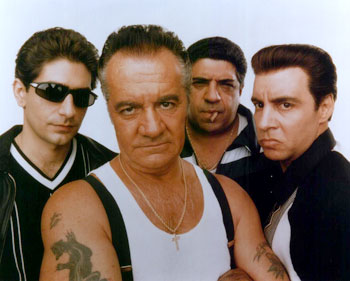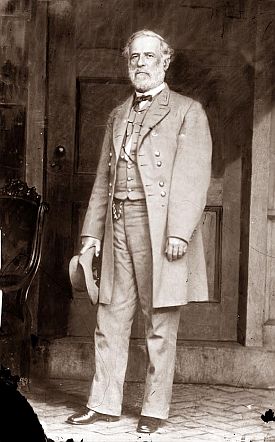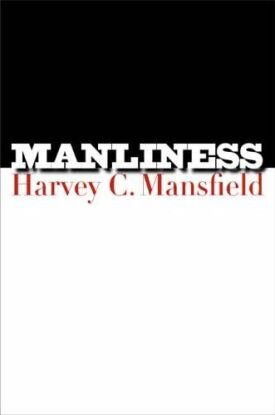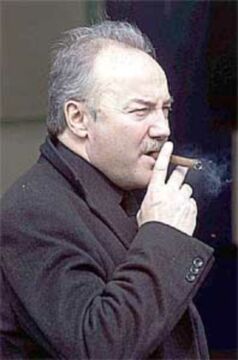Superior Soap Opera
Christopher: I’m workin’ my ass off on this movie script. You know how many pages I got? Nineteen.
Paulie: Is that a lot or a little?
Christopher: Books say a movie’s supposed to be about 120 pages.
Paulie: [whistles softly].
Christopher: With this f***in’ computer, I thought it would do a lot of it.
Paulie [menacingly]: If you’re bein’ frank about the business, kid —
Christopher: I would never do that. It’s only “Suggested by.”
Paulie: That writer — with the bullfights? He blew his own f***in’ head off.
Christopher: I bought a script-writin’ program and everything.
Paulie: My advice? Put that thing down a while. We go get our joints copped and tomorrow the words will come blowin’ out your ass.
Christopher: D’you ever feel like nothin’ good was ever goin’ to happen to you?
Paulie: Yeah. And nothin’ did. So what? I’m alive. I’m survivin’–
Christopher: That’s it. I don’t wanna just survive. It says in these movie-writin’ books that every character has an ‘arc.’ You understand?
Paulie: [shakes his head].
Christopher: Like, everybody starts out somewheres, then they do somethin’, or somethin’ gets done to them. It changes their life. That’s called their arc. Where’s my arc?
Paulie: [shrugs].
Christopher: Like, take Richard Kimball, right? No, that’s no good. His arc is run, run, jump off a dam, run. Ahh [pause] Keanu Reeves. Devil’s Advocate. You see that?
Paulie [smiling with recognition]: Al! [Pacino]
Christopher: Right. Keanu’s a lawyer. Gets all turned on by power, money, the devil. Then his wife says to him: “You’re not the man I married.” Leaves him. You see the arc? He starts down here [holds his hand in front of his face]; he ends up here [moves his hand upward]. Where’s my arc, Paulie?
Paulie: Kid, Richard Kimball, the devil’s whatever: those are all make believe. Hey, I got no arc either. I was born, grew up, spent a few years in the army, a few more in the can — and here I am, a half a wise guy. So what?
Christopher: I got no identity!
from
“The Sopranos” Season One, Episode VIII, written by Frank Renzulli and David Chase, directed by Tim Van Patten.
Television is the great post-modern medium, and in “The Sopranos” — which first ran on HBO a year ago, is being shown in retrospective in December-January and later this month will begin a second series on the same network — it has at last got a great post-modern drama worthy of it. Or at least those statements may be regarded as true except insofar as they are self-contradictions, “greatness” being what post-modernism consciously and inevitably seeks to subvert. Optimistic by nature, however, I have always held that not even the archness, the derivativeness, the fundamental unseriousness of post-modern art can prevent that art from having, like any other, its master practitioners. And like other craftsmen — these are perhaps something more than glass-blowers and something less than furniture designers — they are worthy our (perhaps qualified) admiration.
At any rate, if there are any masters of the craft, there can be no doubt that the creative team responsible for “The Sopranos,” especially executive producer, David Chase, billed as the series’s “creator,” must be among them. I admit to being a skeptic at first. How many times I have heard some new prime-time series touted for its power and artistry — “NYPD Blue” and “ER” come immediately to mind — only to find that it is virtually indistinguishable from everything else on television. That homogenization is, in fact, the principal effect of putting anything on TV, where all programming, even that which began as a serious play or an opera, instantly becomes generic entertainment unless it is so remarkable for wit, originality and intelligence that it can break free of the limitations of the medium
“The Sopranos” not only does this, it exploits those limitations for its own purposes. In the passage quoted above, for instance, two gangsters (played by Michael Imperioli and Tony Sirico) discuss the ambition of one of them, the younger, to be a screenwriter. Just before this scene, the camera has given us a glimpse of the quality of Christopher’s nineteen completed pages in the two lines of dialogue he has most recently committed to the page. They read as follows:
Beautiful girl: “Thank you!!!!”
Chip: “I must be loyle to my capo.”
Here we have a cheesy gangster drama about a cheesy gangster whose ambition it is to write cheesy gangster dramas. But the classically post-modern, self-referential quality of the situation is for once not merely gratuitous, designed mainly to show off the cleverness of the author. Young Christopher’s fumbling attempts to find his own life’s “arc” are for him the same thing as his fumbling attempts to create one for his fictional character (even our glimpse of the name “Chip” suggests its autobiographical nature). The show’s self-consciousness here becomes a metaphor for Christopher’s — and for that which is, in fact, throughout the series, preventing all these gangsters’ lives from assuming the arc which traditional fictions such as The Godfather (constantly alluded to throughout the series by Christopher and others) have led them to expect.
It is therefore wonderfully witty to have Christopher looking to compensate for his dissatisfactions with life as a gangster by becoming a celebrity writer. Even the dimmest of the Soprano associates, Paulie Walnuts (as he is known to his intimates) understands and sympathizes with this ambition when he mentions Hemingway, the prototype of the self-conscious “writer” and the writer as celebrity — the guy who shows us how to be a writer in the same way that Don Corleone shows us how to be a gangster. But wait a minute! Hemingway blew his head off! He knew he was what we know as a “writer” in a way that Don Corleone didn’t know he was what we know as a gangster. And self-consciousness became a curse for him — just as it is becoming a curse for Christopher and his “capo”, Tony Soprano (James Gandolfini).
For Tony is seeing a psychiatrist, Dr. Jennifer Melfi (Lorraine Bracco), because he has been having anxiety attacks. This idea was also the basic premiss of Analyze This, a film directed by Harold Ramis and written by him and Ken Lonergan and Peter Tolan which was released when “The Sopranos” was having its first run last winter. Great minds think alike, obviously. The film is funnier than the television series, but it is played strictly for laughs and carefully avoids making any serious points. When Robert DeNiro as the anxious gangster announces at the end that, as a result of a “corrective emotional experience” (he is not comfortable with the word “cure”), “I’m in a good place and I’m feeling good about me,” it makes a nice comic contrast with the traditional gangster, played by Chazz Palmintieri. But that’s all it does. It is essentially a cheap joke.
There are a certain number of such jokes in “The Sopranos” too — not only where tough Tony easily lapses into psychobabble about his “self-esteem” but also where Christopher engages in Godfather-type histrionics: “This ain’t negotiation time,” he says at one point when he thinks there is about to be a gang “war” with another branch of the family. “This is Scarface, final scene, f*****’ bazookas under each arm: ‘Say hello to my little friend’” — to which one of his fellow thugs mutters: “Always with the scenarios.” But the series makes it clear that both Christopher’s movie-madness and Tony’s therapy fit into a larger cultural process which is undermining traditional gangsterism. Both are natural parts of the suburban, upper middle-class “lifestyle” (as the wise guys don’t quite learn to call it) that they aspire to.
The contrasts between the now-cinematic character of old-fashioned mob activities and the mundane life of a prosperous north Jersey suburb in the 1990s are not cheap jokes. In a brilliant scene in the first episode, Tony’s wife, Carmella (Edie Falco), is talking to a priest late one night when Tony is not at home (the subject is which of the Godfather movies was best) when a noise outside sounds like a window being jimmied. In a flash she produces, seemingly from nowhere, an assault rifle and charges out onto the patio, pointing the gun at — her daughter, Meadow (Jamie Lynn Sigler), who has snuck out and who is trying to get back into her room. Her little brother, Anthony Jr. (Robert Iler), has locked the window so she will get caught. Still brandishing the deadly weapon, Carmella lashes out angrily: Meadow, whose name is redolent of a long outdated middle class hippiedom, is not only grounded, she says, she’s not to be allowed to make a promised trip to Aspen. “Yes!” says Tony Jr.
It is a very funny moment, but there is also a serious side to it. Is not, after all, Meadow’s casual insubordination and her addiction to the clichés of teen culture in protesting against the unfairness of her sentence as much a threat to the family business as any intruder could have been? At the same time, she has all the more reason for her look of teenage disgust when her mother tells her that “you can’t just lie and cheat and break the rules you don’t like.” Carmella is an ordinary suburban wife, her kids ordinary suburban kids, save for the fact that what sustains them and occasionally makes them anxious is Tony’s job in the mob — which he euphemistically describes as “waste management consultant.” Meanwhile, as great as any business anxiety to Tony is that of how he is to keep the truth from the kids, who find his picture on a crime site on the Internet.
“It’s hard to raise kids in an information age,” says Paulie Walnuts.
Nor are the neighbors, as well acquainted with cinematic gangsterdom as Tony’s gang, inclined to see him as a pariah. If anything, they get a little thrill from their proximity to the romance of the mafia. Next door, Dr Bruce Cusamano, who referred Tony to Dr. Melfi, has a dinner party at which he asks: “Being a gangster, what does it mean anyway?”
A male guest says: “That’s true. Some of the s*** I see in the boardroom, I don’t know if I’d make a distinction.”
A woman speaks up: “Oh, will you please — It’s not the same thing.”
Dr. Bruce demurs. “Buggin’? Bribes? I don’t know. Sometimes I think the only thing separating American business from the mobs is f****n’ whackin’ somebody.”
“Listen to you!” says his wife, a woman about whom, Tony confesses to his therapist, he has sexual fantasies.
“What?”
“Whackin’! He hangs around with Tony Soprano for fifteen minutes and it’s f****n’ this and f****n’ that.”
Later some of the guys invite Tony for a round of golf at the country club. One of them says: “Tony, let me ask you a question. Now if I’m steppin’ on toes tell me. How real was The Godfather?” Tony later tells the psychiatrist that he felt humiliated by being made a spectacle of.
In what is perhaps the best of the thirteen episodes to date, Tony takes Meadow to look at colleges in New England. On the road he tries to expose just a little of the reality of his life to her in therapy-speak: “Some of my money comes from illegal gambling and whatnot. How does that make you feel?”
“At least you don’t keep denying it, like mom. The kids in school think it’s actually kind of neat.”
“They seen The Godfather, right?”
“Not really. Casino they like. Sharon Stone, ‘70s clothes, pills.”
Tony’s claim to be really no different from any other father on their prosperous block is met with skepticism. “I don’t think the Cusamano kids ever found $50,000 in Krugerrands and a .45 pistol while looking for Easter eggs,” says Meadow.
“How did you get so cynical?” Tony asks her.
While on the college trip, Tony catches sight of Fabian Petrulio (Tony Ray Rossi), a former mob rat now in the federal witness protection program in Maine, and at once he begins plotting to kill him while Meadow is having an interview at Colby College.The juxtaposition between middle-class ordinariness and the mob’s implacable enforcement of omertB is reinforced by the fact that, on separate occasions, both Tony and his prospective victim hesitate to kill each other on account of the presence of the other’s child. Nor is the juxtaposition lost on Tony himself. At the end of the episode we see him contemplating a plaque at Bowdoin on which are inscribed the words of Hawthorne: “No man can wear one face to himself and another to the multitude without finally getting bewildered as to which may be true.” A passing student notes: “He’s our most famous alumnus.”
Thus Tony’s therapy is at one level an attempt to reconcile the irreconcilable — a life devoted to the Sicilian code of honor with a life devoted to feeling good. Tony himself points this out to the therapist at their first meeting, when he is at his most skeptical. “Nowadays, everybody’s got to go to shrinks and counselors and go on Sally Jesse Raphael to talk about their problem. What ever happened to —” he pauses “— Gary Cooper? The strong, silent type. That was an American. He wasn’t ‘in touch with his feelings.’ He just did what he had to do.” Then, growing more and more passionate, Tony continues: “See what they don’t know was, once they got Gary Cooper in touch with his feelings, that they wouldn’t be able to shut him up, and then it’s dysfunction this, dysfunction that. . .”
Whereupon the shrink brings him back to a kind of reality by noting wryly: “You have strong feelings about this.” It is a reminder that, although he has a kind of detached and theoretical admiration for Gary Cooper, as for his tough-guy forbears in the business, he is himself inextricably involved in the world of feelings. Not only does the very normality he prizes for the wife and kids involve him in it, but at another level he himself sees therapy as simply one of the accoutrements of the suburban existence into which he and the family otherwise fit so naturally. Later we learn that even Paulie has been to a shrink. “I had some issues,” he says with rather less embarrassment than Tony has shown. “Enough said. I learned some coping skills.” The comedy of this moment is superficially similar to but in its context cuts much deeper than that in Analyze This.
That is, it is wryer and more pregnant with the sense of a moral awakening, albeit one which comes only to those who seek, not in vain, for a new accommodation with the moral standards of the community. It’s a small price to pay for the dawning of self-consciousness, whether for good (Tony and the boys begin to acquire a conscience) or ill (their conscience is imperfectly distinguished from the mere narcissism of so much of the therapeutic experience). When Meadow’s high school soccer coach is found to have been sleeping with one of her teammates, Tony doesn’t hesitate to order the coach “whacked.” Later, he allows himself to be talked out of this sanction even though, as he bitterly complains to Dr. Melfi, the man will probably escape all punishment by managing, with the help of the therapy industry, to portray himself as a victim. Yet the episode ends with Tony, full of drink and Prozac, bragging: “Carmella! I didn’t hurt nobody.”
A drama about the birth of self-consciousness is ideally suited to television, because what makes television post-modern is its own self-consciousness. It is possible to be in a movie or on a stage without (as it were) knowing that you are in a movie or on a stage. The actors’ self-consciousness as actors is not built in to the experience of watching a movie or a play — though of course more and more movies and plays are deliberately breaking through the illusion of reality that our inherited expectations half-create for them. But television is not set apart like movies and plays, meant to be watched in a darkened room in a place you have to travel to get to. It is experienced in the midst of daily domestic life. It is as common as dirty dishes.
Therefore, people who are on television are from the start unprotected by the illusion of reality that their brethren of the stage and the silver screen can either take or leave alone. They cannot get away with pretending they don’t know they’re on television. Usually, this self-consciousness leads only to coyness: the smirk on the face of Gary Shandling or Jerry Seinfeld or David Letterman, all of whom seem to expect to be congratulated and applauded for refusing to pretend that they don’t know they’re on television. It’s old hat, guys. We know you know. We don’t really care as we did when TV was younger and we still expected it to be like the movies only in our homes. The witticism of Letterman’s flipping his cue cards through the fake window behind the set to the sound of breaking glass is now nearly 20 years old, yet he continues to do it every show.
Television is like everyday life even in this: there’s no help for the necessity of continuing to do the same things over and over again. That is why, too, all television programming aspires to the condition of soap opera and (naturally enough) the best TV is, like “The Sopranos,” also the best soap opera. Television adaptations of the classics always work or don’t work depending on how close their originals are to soap opera. The simpler Jane Austen and Thackeray can do very well on the small screen — as we saw in the excellent Vanity Fair, adapted for the BBC by Andrew Davies, that appeared on A & E in October. Davies also did the splendid BBC adaptation of Pride and Prejudice of four years ago. Dickens and George Eliot, on the other hand, tend to make poor television.
This is because they are more heavy-duty moralists, concerned with what Christopher would call the “arc” of their characters’ lives. In soap opera, as opposed to real drama, it’s not so much an “arc” as it is a straight line. This is what Christopher is complaining about, post-modern fashion, in episode eight. There is no peripeteia for these characters, no moment at which everything changes, because we know they will all be back tomorrow or next week for more of the same. We can be pretty sure from the time we meet Tony in episode one that he will still have to be around in episode thirteen, so when Fabian Petrulio has him in his sights in episode five, or Uncle Junior (Dominic Chianese) puts a contract out on him in episode eleven, we aren’t too worried. Even when characters do not come back next week, so much of their lives do that it is as if they were still with us. It is the repetition which enforces the banality of domesticity on the passions and casualties that might otherwise take on the meaning and importance of more traditional art forms.
But “The Sopranos” is very superior soap opera indeed. It is soap opera in the mock heroic vein. Like the mock heroic of Cervantes or Pope it depends on our knowledge of a heroic literary background — in this case, the background is made up of the Godfather and other gangster movies that celebrate the culture of honor of an earlier time even where they pretend to condemn it. When Christopher murders a Czech competitor in the garbage business, bigger than life-sized posters of Humphrey Bogart and Edward G. Robinson glower down on the act. Tony’s ideal of American manhood is Gary Cooper. But unlike the Knight of the Woeful Countenance or Pope’s sylphs, the foregrounded characters here know their own littleness and feel alternately humbled by it (“Those people went through World War Two” says Tony admiringly of his mother and his uncle) and furious at its unreasonable demands on those lucky enough to inhabit the consumer heaven of 1990s America.
Tony’s mother, by the way, brilliantly played by Nancy Marchand, is one of the great soap opera villains of all time, like J.R. Ewing or Alexis Carrington, but all her aggression is of the passive variety. Along with the garbage business and an Italian sense of family loyalty, Tony inherited from the World War Two generation a load of guilt and an awestruck appreciation of his mother’s power which turns out to be the real reason he is in therapy. In a moment of exasperation, he says to her: “You know, everybody thought dad was the ruthless one, but I gotta hand it to you: if you had been born after those feminists, you would have been the real gangster.”
“I don’t know what you’re talking about,” says ma. Later, with the same words, she incites his uncle to kill him as punishment for putting her into a nursing home — or “retirement community” as Tony insists on calling it. “It’s more,” he tells her, “like a luxury hotel at Cap d’Antibes.”
“Who’s he?” asks ma.
“A Captain who owns luxury hotels or somethin’,” says Tony. “I don’t know.”
If a real Tony had heard of Cap d’Antibes, we must suppose he would have known what it was. But if this is rather a post-modern joke, it is, like “The Sopranos” itself, a very good one.
Discover more from James Bowman
Subscribe to get the latest posts to your email.




